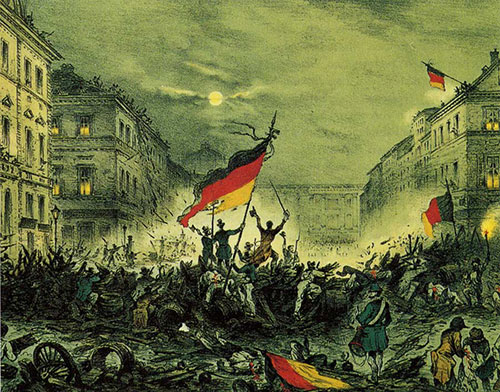Impressions from a Lost World: The Discovery of Dinosaur Footprints
Mid-19th-Century Continental Europe

Image courtesy of Wikimedia Commons.
When Edward and Orra White Hitchcock sailed across the Atlantic Ocean to Europe in the spring of 1850, they encountered a continent in the throes of a democratic revolution. The printing in England in 1848, of the Communist Manifesto in German by Karl Marx and Friedrich Engels epitomized the scope and international scale of the revolutionary fervor sweeping Europe. Calls for electoral reform, freedom of the press and economic reforms rocked monarchies and city states alike. Even in Britain, long considered the stablest European government, millions of English subjects ineligible to vote had signed the “People’s Charter” calling for electoral reform, marching under the banner, “peaceably if we can, forcibly if we must.” On the continent, similar demands for electoral reform mingled with calls for an end to absolutism and monarchical rule.
The revolutions of 1848 began in Sicily in January. Next came the overthrow of King Louis Philippe of France in the “February Revolution,” followed swiftly by unrest in the German city states, Switzerland, Denmark, Sweden, Hungary and other countries. The Hitchcocks and other Americans traveling abroad in the immediate aftermath were acutely aware of the social as well as economic divisions between the privileged upper classes and the less wealthy and underprivileged. In Frankfort, they and other American attendees of the International Peace Conference could not help but note the tense atmosphere and military presence in the aftermath of violent protests during the “March Revolution” that had convulsed the German city states in 1848. Lower attendance may have reflected concerns over reprisal or other trouble for holding what some might condemn as a political meeting in these unsettled times.
The Frankfort Conference was one in a series of Peace Conferences convened annually from 1843-1853. The first conference was organized by an English Quaker, Joseph Sturges, and the American Peace Society. The Hitchcocks attended with John Tappan and his wife; Tappan family members were well-known American reformers active in the Peace Movement on the state, national and international stages. Formally known as The International Congress of the Friends of Peace, conference delegates from across Europe and the United States passed resolutions condemning war, calling for disarmament, and banning the practice of foreign loans for war purposes. The previous year’s conference had been in Paris, where Victor Hugo as president of the gathering called for a future “when all nations on our continent will form a European brotherhood . . . A day will come when we shall see . . . the United States of America and the United States of Europe face to face, reaching out for each other across the seas."